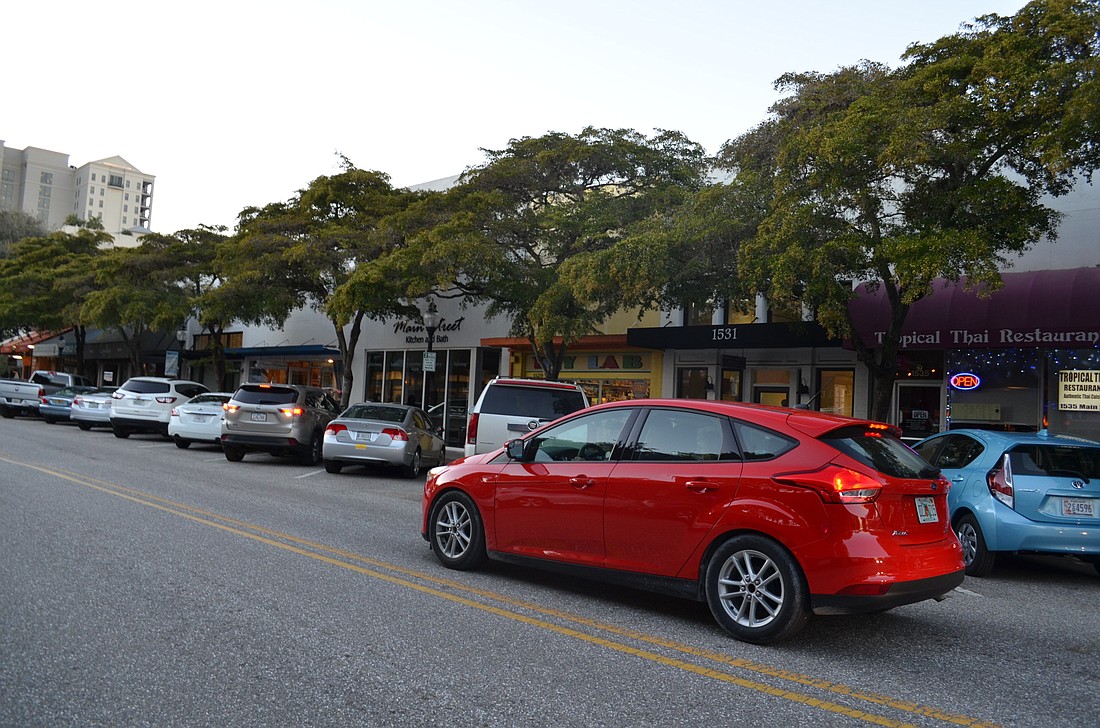- April 8, 2025
-
-
Loading

Loading

City commissioners don’t want to put parking meters on Main Street — which is why the board is searching for an alternative solution for addressing a deficit in the city’s parking fund.
Skeptical about the prospect of returning to a venture that’s failed in the past — and accounting for outspoken merchant opposition — the commission asked staff Monday to develop more information about the effects of installing meters.
City Commissioner Jen Ahearn-Koch, who said she’s “never been for parking meters” downtown, summed up why commissioners aren’t ruling out the possibility of installing meters altogether.
“Part of the discussion needs to be: If not meters, how do we implement a paid parking system that will pay for itself?” Ahearn-Koch said, alluding to an annual loss in the city’s parking operations that has topped $500,000 annually.
As the commission searches for alternatives, here’s an overview of some options officials and businesses have discussed:
City staff’s preferred solution for addressing the parking deficit has a troubled history in Sarasota.
Opponents of parking meters are quick to point out that meters have been installed and removed downtown several times, most recently in 2012 following a short-lived paid parking experiment.
But in 2016, City Parking Manager Mark Lyons presented a comprehensive parking strategy to the commission. That strategy included recommendations to implement paid parking downtown — not only as a revenue-generating measure, but to encourage more turnover in prime spaces along Main Street.
Those plans quickly generated backlash. A 2016 Sarasota Downtown Merchants Association survey showed that 85% of respondents were not in favor of paid parking. On Monday, several merchants encouraged the city to move on from the idea of installing parking meters, expressing fear it would hurt business.
“It unsettles the merchants and the customers,” said Chip Beeman, owner of Pastry Art and Main Bar.
City Manager Tom Barwin offered a defense for using meters. Excess revenue would get reinvested into the districts with meters. It’s a common practice in cities across the country, he said. He compared it to wastewater or waste collection systems, which also charge individuals based on their use of a city service.
Sarasota residents are already paying for parking, Barwin said, as general fund money subsidizes parking operations. Those operating expenses have increased as the city has built two parking garages downtown.
“I have a fiduciary responsibility to you and our community to let you know we have a deficit situation in the parking fund,” Barwin told commissioners Monday. “I expect that situation will continue unless we figure out how to address it.”
Ron Soto, president of the Sarasota Downtown Merchants Association, said the city should consider putting meters in at Lido Beach before it does so downtown.
“Let the tourists pay for it,” Soto said.
Downtown merchants weren’t convinced meters were the only option for addressing the city’s parking issues.
Lyons has said meters will discourage individuals from camping out in premium parking spaces for an extended period. That means there’s more likely to be an open spot directly in front of a business, eliminating frustration that comes from circling the block in pursuit of a space.
But Soto said there’s another way to achieve that goal. If the city extended its parking enforcement hours until 8 p.m., it would prohibit employees from camping out in Main Street spaces that carry no restrictions after 6 p.m.
The city would also have more time to cite individuals who violate parking regulations, particularly if it made time limits effective on Saturdays, as well. Other merchants suggested more stringent enforcement and stricter fines would help cover the deficit.
“It’ll eliminate the problem, and you’ll have better revenue,” Soto said.
Barwin said increasing enforcement would come with its own expenses. He also said the city isn’t eager to ticket visitors, which could upset people just as much as parking meters.
“When people walk into City Hall with a parking ticket, they’re not the happiest campers, either,” Barwin said.
After Monday’s meeting, Ahearn-Koch advocated for a community conversation about parking that addressed the reality of the situation on all sides — accounting for city finances and the downtown business climate.
She said the city should look at other parking programs as models. One possibility she mentioned was creating a special taxing district downtown to fund parking expenses, charging property owners instead of visitors.
Former Commissioner Susan Chapman floated the same idea in 2016, but drew little enthusiasm from downtown business representatives who said the tax would be passed on to them. Soto suggested the growth of downtown has already generated increased city tax revenue, so another tax would go over poorly.
City Commissioner Hagen Brody, who wanted the commission to rule out the possibility of parking meters, suggested the city should be willing to take a loss on its parking operations for the benefit of businesses.
“We have deficits all over, across the board that we subsidize,” Brody said. “To support our small business community should be at the top of our priorities — above parks, above everything else. This is people’s livelihood.”
Barwin stressed that money spent on parking from the general fund limited the city’s ability to spend that money elsewhere. Ahearn-Koch shared similar concerns about whether parking subsidy funds could be better spent.
“Let’s look at what it costs us,” Ahearn-Koch said. “Do you want us to solve the homeless issue? That costs money, too. Do you want us to hire police? That costs money.”